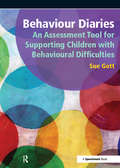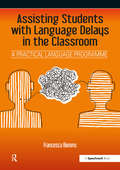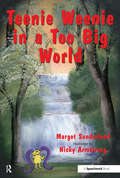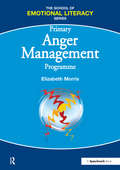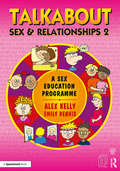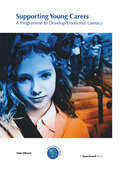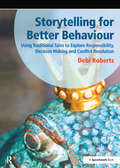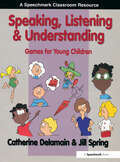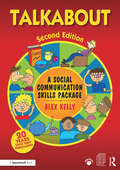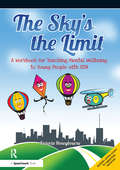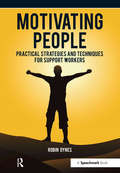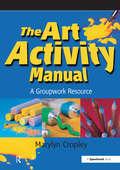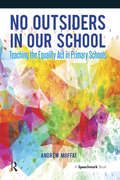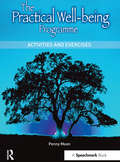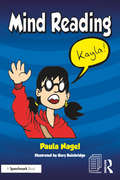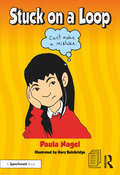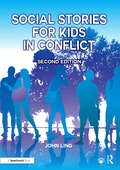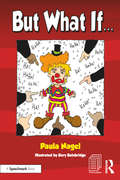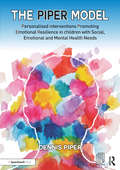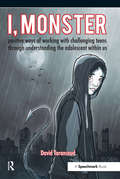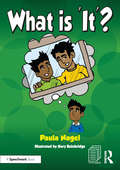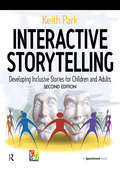- Table View
- List View
Behaviour Diaries: An Assessment Tool for Supporting Children with Behavioural Difficulties
by Sue GottThe invaluable resource provides a sophisticated technique for teachers to observe, assess, plan and evaluate to improve pupil behaviour. The book recognises the diverse demands of the modern classroom and explores ways in which asking the right question can help in the development of effective solutions. This is far more than ticking check lists as it will: develop a more rigorous approach to the tracking and assessment of behaviour related issues; deepen understanding about biological, psychological and social factors influencing behaviour; give examples of reflective and diagnostic practice, informing planning for successful interventions; and explore ways of collecting appropriate information to support requests for interventions from other agencies. The pack includes a CD ROM with reflective tasks, diagnostic tools, illustrative poems and a staff Powerpoint for professional development sessions.
Assisting Students with Language Delays in the Classroom: A Practical Language Programme
by Francesca Bierens'Assisting Students with Language Delays in the Classroom' is a structured language programme designed for teachers and SENCOs to use in the classroom with children and adolescents with a range of language abilities. This resource caters to the needs of a broad range of students who require assistance with their language development, from the pre-verbal skills of language, progressing through to the skills required for effective, interactive conversation. The resource is accordingly structured within three key sections: the Pre-Verbal Skills of Language; the Building Bricks of Language; and the Skills of Conversation. Features: step-by-step instructions; language charts 200+ activities and exercise. Francesca Bierens is a Qualified Speech and Language Therapist and Primary School Teacher with over 33 years experience working with children with speech and language delays and/or disorders, in the Education, Health and Private sectors.
Who-Who-Who Goes Hoo-Hoo-Hoo
by Peter SchneiderThis beautifully illustrated storybook has been written for children who stutter and their parents, carers and teachers. It tells the story of a young hedgehog who stutters and his encounters with several woodland creatures, some of whom stutter and others who do not. In the end they all work together to defeat a monster who lurks in the wood. The story makes clear that it is more important to listen to what someone says rather than the way they say it. It offers a positive message to children who stutter and shows other people, both adults and children, how best to react when talking to a child who stutters and the kind of responses to avoid. The book includes information about stuttering for adults and list of relevant organisations.
Teenie Weenie in a Too Big World: A Story for Fearful Children (Helping Children with Feelings)
by Margot Sunderland(A story for fearful children) One day Teenie Weenie finds himself in a scrumbly screechy place. It is full of noises and crashes and things that swoop and scratch. The worse it gets, the smaller Teenie Weenie feels. After a while, he feels so small that the tiniest insect tries to eat him up. Teenie Weenie feels terrified and desperately alone. But after a while along strolls a Wip-Wop bird who invites Teenie Weenie to come and have a chocolate muffin in his tree house. With the Wip Wop bird and his friend Hoggie, Teenie Weenie learns for the first time in his life all about the power of TOGETHER. He comes to know how very different things look when it's an US not just a ME. And so after that, whenever Teenie Weenie finds himself struggling alone with something too difficult or too frightening, he goes off and finds some TOGETHER.
Anger Management Programme - Primary: Complete Programme (Emotional Literacy Approach S. Ser.)
by Elizabeth MorrisThis is a series of lesson plans to use with a class or group to help them sense, understand and appropriately express their various levels of anger. It is suitable for ages: 4-11, and teachers.
Talkabout Sex and Relationships 2: A Sex Education Programme (Talkabout)
by Alex Kelly Emily DennisTalkabout Sex & Relationships 2 is a comprehensive toolkit for all therapists, educators and support staff who deliver sex education to people with special needs. It is intended primarily to support groupwork but activities can be easily adapted to suit the needs of individuals with varying abilities. The resource emphasises the importance of being well informed in regards to the physical, interpersonal and emotional aspects of sex; including body awareness, consent, sexual health and guidelines for a healthy sexual relationship. It is packed with practical activities which are designed to open up discussion around sensitive issues in a fun, informative and non-judgemental way. Each activity comes with guidance for practitioners on how to prepare for and delivery the sessions. Features include: guidelines to assess the suitability of students for the programme visually appealing and engaging activities with full colour illustrations photocopiable activities which can also be downloaded for free on the accompanying website template letters for parental permission in delivering the sessions This toolkit is the second in a two volume set, the first of which focuses on relationships. Created by Alex Kelly and Emily Dennis as part of the bestselling Talkabout series, this publication constitutes the most complete and trustworthy set of resources available for groupwork focussing on sex and relationships for people with special needs.
Supporting Young Carers: A Programme to Develop Emotional Literacy
by Clare WillcockThis easy to use resource pack is designed for young people aged 6-16 who have a caring responsibility for someone at home. It is best used during one-to-one support sessions. Topics covered include: caring and emergencies, school and friends, personal health, support at home and ways of coping, identifying feelings, self-esteem and self image. By increasing the young person's self-knowledge and recognition of feelings as well as offering practical suggestions and information, this pack enables the young carer to review their own situation, to feel more in control and to come to their own decisions regarding any change that might benefit them.
Storytelling for Better Behaviour: Using Traditional Tales to Explore Responsibility, Decision Making and Conflict Resolution
by Debi RobertsUsing Traditional Tales to Explore Responsibility, Decision Making and Conflict Resolution provides a method to teach students to reflect, consider and think in ways that can enhance the potential they have for making good decisions and resolving conflicts peacefully. The book provides a series of thinking tools, incorporating both graphic organisers and concept maps and are part of a thinking process known as Theory of Constraint. As well as an approach to conflict resolution, the student programme incorporating over 35 sessions, helps develop emotional literacy. The programme will help students: increase ability to empathise; improve language and communication skills; develop an understanding of conflict in terms of win-win rather than win-lose; and realise behaviour is a choice and that actions have consequences. There are comprehensive facilitator notes for all of the sessions with student PowerPoint slides to reinforce the teaching points. The CD ROM has all the student activity sheets, student PowerPoint as well as a staff development PowerPoint and a Glossary of Terms. Suitable for ages: 7 - 18.
Speaking, Listening and Understanding: Games for Young Children (The\good Communication Pathway Ser.)
by Catherine Delamain Jill SpringWritten by two experienced speech language therapists, who have worked extensively alongside mainstream teachers, this book provides activities that are both teacher and child friendly. It contains a collection of graded games and activities designed to foster the speaking, listening and understanding skills of children aged from 5 to 7. The activities are divided into two main areas: Understanding Spoken Language: Following Instructions; Getting the Main Idea; Thinking Skills; Developing Vocabulary; Understanding Inference. Using Spoken Language: Narrating; Describing; Explaining; Predicting; Playing with Words. Each activity has a clear aim, simple instructions, and requires minimal equipment. Activities may be carried out by teachers, classroom assistants or volunteers. Incorporates user-friendly opportunities for assessment, target setting and evaluation. Includes photocopiable material to support the activities. "Many of the activities can be used by speech language therapists, and the book can be used as an effective part of a speech and language programme. Promotes the skills outlined in Speaking and Listening in the English National Curriculum Key Stage One.
Talkabout: A Social Communication Skills Package (Talkabout)
by Alex KellyThis core Talkabout manual is a practical resource essential for Speech and Language Therapists and other professionals who need to help people with special needs develop social skills. Over 60 activities form an extensive, structured social skills programme that can easily be adapted for use with children, adolescents and adults. Written by bestselling author and practising Speech and Language Therapist, Alex Kelly, this book sits at the centre of an internationally renowned series of resources supporting social skills. Contents include: a social skills assessment and intervention planning tool to help you identify the best way forward for each client or group over 60 activities focussing on body language, conversation and assertiveness 25 group cohesion activities to help you facilitate well-run, productive group sessions a wealth of handouts supporting the activities that can be freely downloaded and printed. This updated second edition of Talkabout sits alongside Talkabout for Teenagers and Talkabout for Adults, as well as three titles published for children (Developing Self Awareness and Self Esteem, Developing Social Skills and, Developing Friendship and Skills).
The Sky's the Limit: A Workbook for Teaching Mental Wellbeing to Young People with SEN
by Victoria HoneybourneThis significant new resource is designed to support young people with special education needs (SEN) to understand what is meant by mental wellbeing and to help them to learn skills and strategies which will support them in maintaining their mental health. The resource is designed to be a clear, accessible and easy-to-use resource that can easily be used by professionals (teachers, teaching assistants, pastoral staff, and social workers) and parents with no prior experience of teaching mental wellbeing. Victoria Honeybourne, Specialist Teacher in a Secondary School Language Unit.
Motivating People: Practical Strategies and Techniques for Support Workers
by Robin DynesIn all types of support services and care situations one of the biggest challenges is motivating people to change their behaviour. It particularly applies to individuals who are difficult to motivate because they might lack insight, wilfully ignore or refuse to face their situation, are affected by depression or health problems or are victims of unfortunate circumstances or fear of failure. The task may be to motivate someone to improve their quality of life by participating in a group in a residential home, change a lifestyle because of health reasons, address offending behaviour, learn a new skill to obtain a job or complete an anxiety management programme. The strategies and techniques will help: arouse their interest in making changes; encourage the consideration of change; support their planning for change; mentor the person through planned actions; ensure momentum is maintained; guide the person in making positive use of any relapses; and make sure the change is successfully achieved. This is an invaluable resource for support workers, social workers, health workers, youth workers, probation officers, employment services, tutors and carers. The techniques can be applied when working with individuals or groups in all types of settings including residential homes, day centres, probation, education or youth work.
Monica Plum's Horrid Problem: A Story For Children Of Troubled Parents (Helping Children with Feelings)
by Margot Sunderland Nicky ArmstrongThis is a story for children with troubled parents. Monica has a horrid problem. It gets everywhere: into her schoolwork, her dreams, and her ability to make friends. People keep telling her to cheer up. She can't. She feels as if she is carrying around some very heavy luggage. Then one day, a helpful teacher sees how miserable Monica is, and tells her about the knights in the world, who are posing as people. In a whispering wood, Monica finds some of these knights. They teach her how to make her problem far less horrid. In particular they show her how to cope when other people's problems weigh you down and make you feel miserable. Most importantly they show her how to do life well. Monica leaves whispering wood feeling empowered and ready to face what she could not face before.
The Art Activity Manual: A Groupwork Resource
by Marylyn CropleyA simple, flexible and practical approach to art activities, this book enables group members to explore and discover their own level of artistic skills, creative styles and preferences. The activities can be used by anyone, regardless of art ability, and there are more than 100 ideas and suggestions with detailed session plans. Based on 'doing and enjoying', the activities use the minimum of equipment and can be adapted to suit people with mixed abilities and level of need. Specifically designed for adults with learning disabilities, physical disabilities and sensory loss, people with mental health needs and older people, the activities can also be used by teachers and individual artists. Art is a powerful intervention and communication tool, and these activities can also be used to improve communication skills, build confidence and self-esteem, and develop self-awareness. The practical and non-prescriptive approach of this photocopiable book is ideal for all group facilitators who need a quick and easy way of using art activities therapeutically.
No Outsiders in Our School: Teaching the Equality Act in Primary Schools
by Andrew MoffatThis brand new resource provides much needed support for every primary school in the delivery of the objectives outlined in the Equality Act 2010; and in the provision of personal, social, health and economic education (PSHE) for every child. This resource provides teachers with a curriculum that promotes equality for all sections of the community. But more than that, the resource aims to bring children and parents on board from the start so that children leave primary school happy and excited about living in a community full of difference and diversity, whether that difference is through ethnicity, gender, ability, sexual orientation, gender identity, age or religion. The resource includes 5 lesson plans for every primary school year group (EYFS- Y6) based upon a selection of 35 picture books. Issues addressed include: gender and gender identity, religion, sexual orientation, disability and age. There is an introductory chapter explaining the legal framework behind the resource, quoting Ofsted and the DfE. A second chapter focuses on creating the whole school ethos through assemblies, school displays and after school clubs. A third chapter focuses on engaging parents. Age 7+ Format 96pp, paperback (245 x 171mm) Andrew has been a full time teacher for 20 years and is currently the Assistant Head Teacher in a large primary school in inner city Birmingham.
The Practical Well-Being Programme: Activities and Exercises
by Penelope MoonThis book is intended for all those interested in well being and a holistic approach whether it is in schools colleges, social settings, family support or business. The development of the programmes came out of work in Liverpool supporting families of children with severe emotional and behavioural difficulties. This book introduces readers to the underlying principles and approaches associated with a holistic approach to well-being in educational and other social contexts. Originally a specialised 'within schools' programme of therapeutic support for pupils experiencing social, behavioural and /or emotional difficulties. Based on the concept of 'holism' in its fullest sense, it utilises both traditional and complementary approaches in support of the whole person - mind, emotions, body and spirit, in the context of their whole life, incorporating support for the individual, the family, school staff within the environment and where applicable, the wider community. Each chapter consists of two main parts: information and background; activities that may be used by the teacher as well as in the classroom. The exercises at the end of each chapter are developmental in nature and divided into: Reflective Journal - encourage reflective practises and the development of emotional and spiritual intelligence by recording feeling as well as thoughts and actions; wordsmith - to encourage the development of interest in words, playing with words and defining their terms, interpreting meaning and investigating their source, etc; Activities - Knowledge tree - using the internet to develop their own knowledge tree and allow imagination to develop; activities for the classroom - fun ideas that reflect the key points of each chapter; and Things to do - ideas to develop outside the classroom, places to go, etc. The book also includes Guided Visualisation- learning through the use of 'altered states' and relaxation exercises. These include a series of guided visualisations which include physical, emotional, intellectual and creative practices. It covers A5 paperback+ CD, 162 pages.
Mind Reading: But What If...; Mind Reading; Stuck On A Loop; Waht Is It? (Rollercoaster Series)
by Paula NagelThis is a focus on feelings of social isolation and unhelpful thinking habits linked to friendship difficulties. Stacie wonders why her best friend, Kayla, ignores her when she sees her in town at the weekend. All weekend she thinks about the possible reasons, and imagines some of the negative things Kayla might be saying or thinking about her. By Monday morning, she has convinced herself they are true, and that Kayla no longer wants to be her friend. She avoids Kayla at school, which causes further problems. At break time Stacie sees Kayla with another group of girls and imagines they are talking about her. At the end of the day Kayla catches up with Stacie and asks her if she has done something wrong. Stacie says she knows Kayla no longer wants to be her friend because she ignored her in town. Kayla explains she had just been fitted with her new contact lenses and didn't even see her! Stacie is shocked and confesses how she imagined she knew what Kayla was thinking and saying about her. Kayla laughs and they joke about Stacie being a very poor 'mind reader'. Stacie agrees that if she catches herself mind reading again then she will test out her thoughts by talking about them. The accompanying, 'Let's talk about.mind reading,' highlights this common thinking error, and suggests further coping strategies. Paul Nagel has worked as an educational psychologist for 17 years. This has included working as a Lead Professional Educational Psychologist managing a traded service, as well as holding Senior Specialist posts for early years and disability. Over the years Paula has worked in multi agency teams within paediatric services, youth offending teams, Sure Start and an anti bullying service. She is currently Principal Educational Psychologist (North) for the national children's mental health charity, Place2Be. Before qualifying as an Educational Psychologist Paula was a primary school teacher. Gary Bainbridge is an artist, comics creator and secondary school Art, Photography and Media Studies teacher from Durham. He's best known for the North East based kitchen sink superhero comic Sugar Glider and the Newcastle-set crime fiction comic, Nightbus. Gary teaches at an academy in Northumberland.
Stuck on a Loop: But What If...; Mind Reading; Stuck On A Loop; Waht Is It? (Rollercoaster Series)
by Paula NagelThis is a focus on intrusive thoughts and repetitive behaviour, linked to exam anxiety. Everyone knows Gemma always gets thing 'right' and is top of the class. However she feels under pressure to do well in the Year 5 tests and is becoming increasingly worried. She thinks she has to do certain things to continue to do well and get 'top marks', such as avoiding the cracks in the pavement. This habit starts to take over and Gemma wonders why she is doing this. As the story progresses, Gemma is helped to understand how it can be normal for anxiety and stress to affect thoughts. The metaphor of having a bully in her mind, making her do things she doesn't really want to do, is introduced. She decides to stand up to her inner bully before it takes over. The accompanying, 'Let's talk about. when thoughts get stuck,' highlights how stress and pressure can affect us, including some of the 'catastrophising' and 'black and white' thinking errors that can be linked with exam stress and pressure. Paul Nagel has worked as an educational psychologist for 17 years. This has included working as a Lead Professional Educational Psychologist managing a traded service, as well as holding Senior Specialist posts for early years and disability. Over the years Paula has worked in multi agency teams within paediatric services, youth offending teams, Sure Start and an anti bullying service. She is currently Principal Educational Psychologist (North) for the national children's mental health charity, Place2Be. Before qualifying as an Educational Psychologist Paula was a primary school teacher. Gary Bainbridge is an artist, comics creator and secondary school Art, Photography and Media Studies teacher from Durham. He's best known for the North East based kitchen sink superhero comic Sugar Glider and the Newcastle-set crime fiction comic, Nightbus. Gary teaches at an academy in Northumberland.
Social Stories for Kids in Conflict (Speechmark Practical Therapy Manual)
by John LingSocial Stories for Kids in Conflict is a practical guide to help young people improve their behaviour. Designed to help all those who work and/or live with young people who have difficulties with their behaviours and relationships with others, this book is a practical guide to help young people become more aware of their behaviour and its effect on other people. Focusing on mediation (including communication, the unblocking of channels, the breaking down of barriers, the righting of wrongs, making amends, and restorative justice), the book includes: dialogues used by a neutral person to highlight difficulties and possible changes in behaviour cartoons and other visual techniques that can be used to present alternative ways to discuss problems examples of social stories covering personal stuff, daily routines, home life, social skills, homework, work and playtime, PE and games, as well as a guide to writing your own social stories Powerpoint presentation for staff, parents and carers. Developed from work with children and young people with Autism, Asperger Syndrome, and related conditions, as well as troubled young people with no named condition, the ideas and techniques can be used and modified to help all young people to become more aware of their behaviour and its effect on other people. This 2nd edition has been revised and updated and now includes an expanded section of social stories.
But What If: But What If...; Mind Reading; Stuck On A Loop; Waht Is It? (Rollercoaster Series)
by Paula NagelThis is a focus on worries about transition to secondary school. Jake is in Year 6. He is worried about the transition to secondary school because he has heard many rumours, including one about the older pupils flushing first years' heads down the toilets. The story illustrates how many of the pupils share similar worries about the impending transition even though their behavior looks different. Jake's behaviour illustrates his initial negative coping strategies as his worry grows. This includes not talking about it, opting out of his usual interests and activities, not sleeping and becoming angry with his mother. Some of his worries are alleviated on his taster visit to the new school, especially when he plucks up the courage to go into the boys' toilets. Following a misunderstanding in the toilets with some older boys, he is able to share his worries with another pupil and use humour to reflect on his behaviour. The accompanying, 'Let's talk about .worry,' text shares information and facts about mental health and transition. Paul Nagel has worked as an educational psychologist for 17 years. This has included working as a Lead Professional Educational Psychologist managing a traded service, as well as holding Senior Specialist posts for early years and disability. Over the years Paula has worked in multi agency teams within paediatric services, youth offending teams, Sure Start and an anti bullying service. She is currently Principal Educational Psychologist (North) for the national children's mental health charity, Place2Be. Before qualifying as an Educational Psychologist Paula was a primary school teacher. Gary Bainbridge is an artist, comics creator and secondary school Art, Photography and Media Studies teacher from Durham. He's best known for the North East based kitchen sink superhero comic Sugar Glider and the Newcastle-set crime fiction comic, Nightbus. Gary teaches at an academy in Northumberland.
The Piper Model: Personalised Interventions Promoting Emotional Resilience in children with Social, Emotional and Mental Health Needs
by Dennis PiperThis book is intended to be both a practical evidence-based tool and an awareness-raising resource for teachers, teaching assistants, mentors and all adults who work with children and young people who present as 'extremely challenging' in the school context. In every school there are a small number of pupils, less than five percent, who take up more than fifty percent of the staff's time. This book provides school staff with an approach to personalised interventions that enable those children or young people to build life-long resilience skills.
Really Useful ASD Transition Pack
by Alis HawkinsUsing snippets of practice-based theory, this title provides an overview of considerations as diverse as sensory sensitivities and their impact on the school day, how interactions in the playground might be handled and whether the pupil is allowed to eat separately, as well as teaching and learning issues.
I, Monster: Positive Ways of Working with Challenging Teens Through Understanding the Adolescent Within Us
by David TaransaudI, Monster is a resource for all professionals in health and education who work with challenging young people. The book aims to explain the issues behind challenging behaviour, to enable empathy, and to facilitate a more productive therapeutic relationship between the health/education professional and the child. I, Monster is divided into three parts. Part one suggests that our greatest foes lurk deep within ourselves, and that knowing our own darkness is the best method for dealing with the darkness of other people (Jung, 1973). Part two focuses on the inner world of adolescents who use aggression to manage early terrors. Part three explores approaches and strategies to help them heal the pain of the past. Full of case studies as well as coverage of key concepts and theory, this book offers a fascinating insight into the minds of the young people you work with.
What is it?: But What If...; Mind Reading; Stuck On A Loop; Waht Is It? (Rollercoaster Series)
by Paula NagelThis is a focus on low mood associated with bereavement. Sam feels low and fed up, but doesn't understand why he feels this way. Everyone else has an opinion on the change in his behaviour. His teacher thinks he is being lazy and can't be bothered to finish his work, his mum thinks he is moody and bad tempered, his friends think he is no fun any more and turning into a bore. Comments like, 'Cheer up it might never happen', ' What has got into you?' and 'Do you want to talk about it?' just upset him even more. He doesn't know what the 'it' is, that is making him feel this way. He didn't even feel this bad when his cousin died a year ago! When he is kept behind in class for not completing his work he tells the teacher how confused and sad he feels. Connections are made between his feelings and the looming anniversary of his cousin's death. Sam is helped to understand that thoughts and feelings associated with bereavement can come and go for a long time, and can cause strong emotions. He is shown how to notice and share his feelings and to think about things he can do when he feels this way. He makes a memory box so he can also remember all the happy things about his cousin. In the 'Let's talk about .sadness and loss,' section, feelings associated with bereavement and helpful coping strategies are shared. Paul Nagel has worked as an educational psychologist for 17 years. This has included working as a Lead Professional Educational Psychologist managing a traded service, as well as holding Senior Specialist posts for early years and disability. Over the years Paula has worked in multi agency teams within paediatric services, youth offending teams, Sure Start and an anti bullying service. She is currently Principal Educational Psychologist (North) for the national children's mental health charity, Place2Be. Before qualifying as an Educational Psychologist Paula was a primary school teacher. Gary Bainbridge is an artist, comics creator and secondary school Art, Photography and Media Studies teacher from Durham. He's best known for the North East based kitchen sink superhero comic Sugar Glider and the Newcastle-set crime fiction comic, Nightbus. Gary teaches at an academy in Northumberland.
Interactive Storytelling: Developing Inclusive Stories for Children and Adults
by Keith ParkInteractive storytelling, where the story is spoken or chanted, began as a way to include individuals with severe and profound learning disabilities in larger group activities, whether children at school or adults in day services. The stories are performed in call-and-response - one person calls out a line and the rest of the group respond either by calling back the same line or by calling out a pre-arranged response - and require no previous experience in drama or storytelling. They can be performed anywhere, by anyone. Various stories are explored, ranging from folktales and pantomime to poetry, the works of Charles Dickens, Shakespeare and stories from the Old Testament. Each extract details the full call-and-response for performing the story. This approach to storytelling can be used by teachers and group facilitators in a variety of settings and with any group of children or adults, irrespective of their level of disability. This hands-on manual will enable teachers, therapists, parents and anyone working with children or adults in community settings to use performance and recital to bring stories, drama and poetry to life for people of all abilities. 'This book is a useful resource...is simply written...is especially appropriate for people working with children and adults with speech, language and communication difficulties.' - Child Language Teaching and Therapy.
